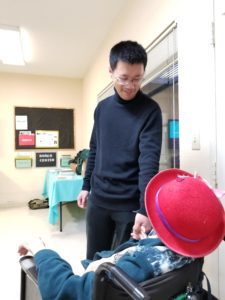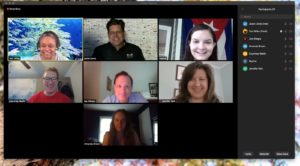Nursing home populations have been among the hardest hit by the COVID-19 pandemic, and as a result, these communities are bearing a disproportionate burden of the grief and loss associated with the virus.
“In the U.S., we’ve never been comfortable with talking about death,” said Toni Miles, a physician and professor in the Department of Epidemiology and Biostatistics, who has been studying how American cultural norms around grief hurts our health and what can be done to fix it.
Miles points to a study from Pennsylvania State University, which calculated that for every COVID-19 death, approximately nine surviving Americans will lose a close relative. Now that the number of American deaths from COVID-19 has climbed past 200,000, this means that more than 1.8 million have experienced loss.
“We think so much about preventing death that we hardly give much thought to the survivors, the people left in the room,” she said.
This is especially true in long-term care settings, where Miles has spent years trying to change how facilities respond to death.
A MODEL FOR CHANGE

Ruiyuan Zhang, a doctoral student in epidemiology and biostatistics, interacts with a resident during a bereavement care training session with residents and staff at a nursing home in Athens, Ga. (Contributed photo.)
Changes may be on the horizon in Georgia, in part, due to a bereavement care program Miles has launched in nursing homes and assisted living facilities across the state.
In 2016, Miles and her team conducted more than 60 hours of interviews with staff, residents and family members in nine long-term care facilities in middle Georgia. Participants identified practices used to support residents, families, and staff during critical end-of-life transitions. They also identified unmet areas of need.
These in-depth interviews, along with funding provided through the Centers for Medicare and Medicaid Civil Monetary Penalty Fund Reinvestment Program, led to the creation of two handbooks on “Best Practices in Bereavement Care” – one designed for residents and family members, and a second for staff.
Both address best practices related to coping with death. They include creating a caring and respectful process for handling the deceased, scheduling memorials to honor the lives of those who have passed, supporting residents and families, and clearly publicizing resident and family support services. There are also specific strategies to address staff stress.
The bereavement care program’s main objective, said Miles, is to help staff and residents recognize their own feelings about loss and grief, which is not trivial.
“We’re used to having some kind of gathering, whether that’s a funeral or some kind of celebration remembering the dead,” she said. “In nursing homes, death was handled through one of two ways – hide the body away or what has been called the ‘trip to Valhalla.’” This approach, explained Miles, resembles a moving wake where nursing home residents and staff had a chance to say final goodbyes as the deceased was moved out of the building under a sheet.
Yet, facilities often overlook their staff’s need to grieve.
“There is this impression that it’s part of the job. They just need to toughen up and deal with it,” said DrPH student Amanda Brown-Brundage, who served as project manager. “But staff have really close relationships with the residents that help improve the care that they give.”
Emphasizing to staff that they have the ability to help families is another goal of the program, said Miles. “You might be surprised to hear this, but not everyone gets sad when a loved one dies. Some people get angry and act out. The nursing assistants know this, but now through our training, they know how to respond.”
The handbooks, which were distributed to nursing homes in Georgia and several other states, were well-received, said Brown-Brundage. “The positive response actually paved the way towards getting our next grant. Long-term care facilities who received the materials told us these are great practices, but how do we apply them within our facilities.”
Miles and her team were awarded a second CMP grant in 2019 to conduct face-to-face educational seminars and staff training, over 24 months, in almost 400 Georgia nursing homes and assisted living residences. To develop the instructional materials they would need, Miles and her team traveled across north and central Georgia, this time with a videographer in tow, capturing the voices of long-term care communities.
“In addition to residents, we recorded the voices of certified nursing assistants, directors of nursing, social workers, activity directors, admissions counselors. All of these perspectives offered important responses to the unmet need for bereavement care in skilled nursing and long-term care facilities,” said Miles.
A NEW NORMAL
When the COVID-19 pandemic hit the U.S. in full force in March, nursing homes across Georgia began closing their doors to stop the spread. Miles and her team pivoted quickly, translating the in-person training sessions they had just started rolling out for online delivery.
By April, Miles was presenting the first online version of the training to staff at the National Church Residences, whose assisted living facilities are home to over 1,000 low-income seniors in Atlanta.
One benefit of the shift to virtual training is that it has allowed Miles to expand her reach of the program beyond Georgia’s network of long-term care facilities to providers in other parts of the country. In the fall, she led training sessions at conferences focused on quality in long-term care in Texas and Oregon. Texas has over 1,200 certified nursing home facilities; Oregon has 137.
“My hope is that, through this program, people will be able to respond to the grief of persons they know. Too many folks express the idea that they don’t know what to say. Our interviews with persons who have experienced loss provide these words,” said Miles.
Secondly, Miles hopes this work helps contribute to improving the quality of care provided to residents and their families in nursing homes.
As the pandemic continues, people are not just struggling with the loss of loved ones, but also the loss of livelihoods, said Miles.
“People need to incorporate bereavement into the new normal. You can’t ignore it. All of us, even those of us who haven’t been scarred by this pandemic yet, need to be kinder to other people. Panic is everywhere. Anger is everywhere. And a lot of it is driven by loss.”
– Rebecca Ayer
Posted on April 07, 2021. Originally published in the 2020 Issue of UGA College of Public Health Magazine.







